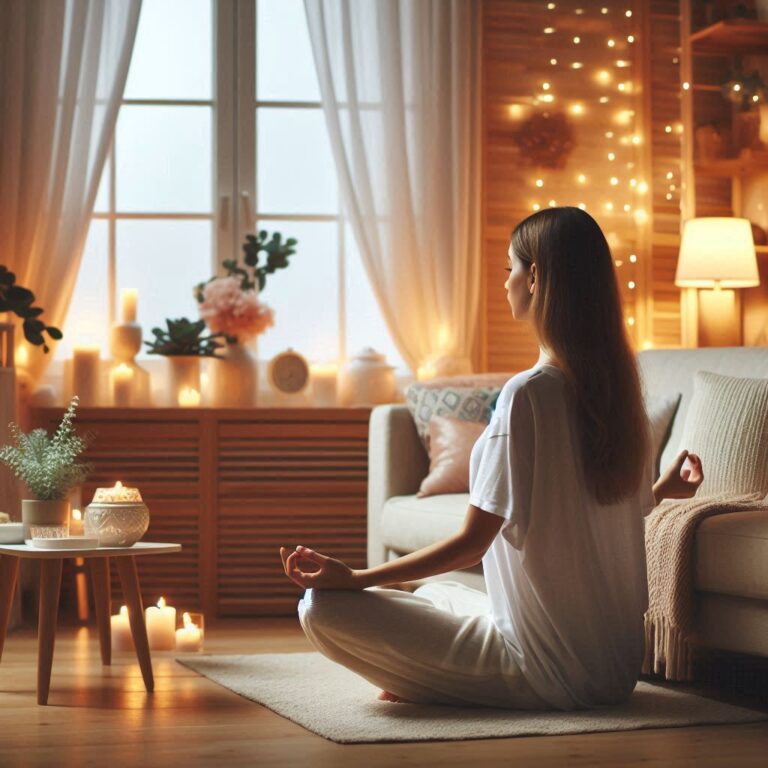How to Overcome Anxiety Naturally: Effective Strategies for Calm and Clarity
Discover simple, natural methods to manage anxiety without medication and reclaim your peace of mind
Have you ever felt that tight knot in your stomach, racing thoughts, or that constant sense of unease that just won’t go away? Anxiety can feel like an uninvited guest that overstays its welcome, affecting your ability to think clearly and live peacefully. And let’s be real—sometimes, managing anxiety feels like trying to hold onto a balloon that’s constantly slipping through your fingers. But what if there was a way to release that tension without relying on medication or drastic lifestyle changes?
I’ve been there myself. A few years ago, I struggled with anxiety that seemed to control my daily life. I tried therapy, but I also found solace in some natural practices that helped me regain control. In this post, I’ll share how you can overcome anxiety naturally, with proven methods that calm your mind and restore your emotional balance. By the end of this article, you’ll have the tools to reduce anxiety and feel more at peace each day
Why Managing Anxiety Naturally Works
Before diving into specific strategies, let’s first take a moment to acknowledge why natural approaches can be so effective in reducing anxiety. Unlike prescription medications that often come with side effects or dependency issues, natural methods work by addressing the root causes of anxiety—stress, hormonal imbalance, and mental overload. These techniques are designed to nurture your body and mind in a holistic way.
The beauty of natural remedies is that they help promote emotional balance in a way that aligns with your body’s innate rhythms. They don’t just numb the symptoms—they address the source and teach you how to manage anxiety in a sustainable, lasting way.
- Mindfulness Meditation: Quiet Your Mind
If you’ve ever tried to quiet your racing thoughts, you know how impossible it can feel. This is where mindfulness meditation comes into play. Practicing mindfulness helps you focus on the present moment, which breaks the cycle of constant worry about the future or regrets about the past—two of the biggest triggers for anxiety.
Let me tell you a story about Sarah from Florida. Sarah’s job was constantly stressful, and it felt like she was always on edge. One day, a friend recommended she try mindfulness meditation to combat her overwhelming feelings. At first, she was skeptical. But after just a few weeks of dedicating 10 minutes each day to mindfulness, Sarah noticed a significant change. Her anxiety levels dropped, and she felt more present in her life rather than consumed by fear and worry.
The key here is consistency. Even if you start small—just five minutes a day—your mind will begin to learn how to shift from anxiety to peace. So, start by sitting in a quiet spot, closing your eyes, and focusing on your breath. Every time your mind starts to wander, gently bring it back to the present.
Actionable Tip: Find a quiet place each morning to practice mindfulness. Use a meditation app like Headspace or Calm to guide you through your practice if you’re new to it.

2. Breathing Exercises: Reset Your Nervous System
Breathing exercises are one of the most powerful tools in your anxiety toolbox. It sounds simple, right? But proper breathing can actually reset your nervous system, bringing your body from the “fight or flight” mode of anxiety into a relaxed state.
Lisa from Seattle was a chronic worrier. She struggled with anxiety attacks every week, often triggered by minor stressors. One evening, after feeling overwhelmed at work, Lisa decided to try deep breathing exercises. She followed the “4-7-8” breathing technique: inhale for 4 seconds, hold for 7, and exhale for 8. After just a few rounds, she felt a wave of calm wash over her, and her anxiety subsided.
Breathing exercises are quick, easy to do, and can be done anywhere—whether you’re at work, at home, or even in traffic. This technique helps to activate your parasympathetic nervous system, which calms the body and restores emotional balance.
Actionable Tip: Try practicing the 4-7-8 technique twice a day—once in the morning and once before bed—to reduce overall anxiety levels.
- Exercise: Move Your Body to Move Your Mind
We’ve all heard it before—exercise is a great way to combat stress and anxiety. But what’s really happening when you exercise is that you’re releasing endorphins, the body’s natural mood boosters. These “feel-good” chemicals help alleviate anxiety by balancing the stress hormones in your body.
Take Jake from Chicago, for example. Jake’s anxiety started as occasional worries but quickly escalated into constant nervousness that affected his sleep and productivity. His doctor suggested that he add exercise to his daily routine. Initially, Jake wasn’t convinced, but he gave it a try. After a few weeks of jogging in the mornings, Jake noticed a huge shift in his mood. Not only did he feel physically healthier, but his anxiety levels dropped significantly.
Exercise doesn’t have to mean an intense gym workout—it could be as simple as a daily walk, yoga, or dancing in your living room. The key is to get moving and make it a habit.
Actionable Tip: Aim for at least 30 minutes of moderate activity most days of the week. Whether it’s yoga, jogging, or a brisk walk, find an activity you enjoy to make it sustainable.
- Herbal Remedies: Nature’s Calming Touch
Nature provides us with a variety of herbs that have been used for centuries to help manage anxiety naturally. Herbal remedies can act as mild sedatives, easing tension and promoting relaxation. Popular options include chamomile, lavender, valerian root, and lemon balm.
I remember the first time I tried chamomile tea for anxiety. It was after a particularly stressful day at work when my mind was racing with worry. I brewed a cup of chamomile tea, sat in a quiet spot, and sipped slowly. Within 30 minutes, I felt more relaxed and ready to rest.
These herbal remedies are gentle yet effective, and they don’t come with the side effects that prescription medications might offer.
Actionable Tip: Try drinking chamomile or lavender tea before bed to promote relaxation and better sleep.

- Aromatherapy: Essential Oils for a Calmer Mind
Aromatherapy is another powerful way to combat anxiety naturally. Essential oils like lavender, bergamot, and frankincense have been shown to reduce feelings of anxiety and promote a sense of calm. Using essential oils in a diffuser or adding a few drops to your pillow before sleep can create a peaceful environment that supports emotional balance.
Emily from Texas found that using essential oils helped her reduce her anxiety levels, especially during stressful meetings at work. By adding a few drops of lavender essential oil to her diffuser, she was able to create a calming atmosphere that helped her stay grounded and focused throughout the day.
Actionable Tip: Invest in a diffuser and add calming essential oils like lavender or bergamot. Use it during meditation, relaxation time, or before bed for a restful night’s sleep.
Conclusion: Reclaim Your Calm
Overcoming anxiety naturally is not a one-size-fits-all approach. What works for one person might not work for another. However, by incorporating practices like mindfulness meditation, breathing exercises, exercise, herbal remedies, and aromatherapy, you’ll find that you have the tools to reduce anxiety and regain emotional balance.
I can tell you from personal experience that taking small, consistent steps each day has transformed the way I deal with anxiety. It’s not about eliminating anxiety completely—because life happens—but about learning how to manage it in a healthy, natural way.
If you’re ready to start your journey to a calmer, more peaceful life, try incorporating these methods into your routine. You’ve got this!

